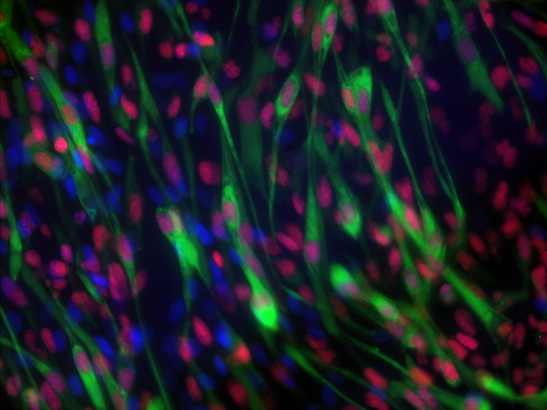Rhabdomyosarcoma cells (courtesy of Dr Ewa Aladowicz in Professor Janet Shipley's team at the ICR)
Sarcomas are cancers that develop in the supporting tissues of the body, including the muscles, tendons and bone.
Rhabdomyosarcomas are a type of sarcoma that resembles muscle tissue. Although rare, it is a particularly cruel cancer, which tends to affect children and young people. Surgery, chemotherapy and radiotherapy are the usual avenues of treatment and while these treatments can be effective they can be harsh in children.
Most survivors of rhabdomyosarcoma will suffer life-altering changes, such as loss of mobility, growth impairment and developmental problems, and an increased risk of developing another cancer as a consequence of their therapy.
No substantial improvement in survival rates for rhabdomyosarcoma has been seen in the past few decades. At present, there are no effective targeted treatments for the aggressive forms of the disease and new treatment approaches are desperately needed.
One of the world’s leading authorities on research into soft tissue sarcomas is Professor Janet Shipley, Professor of Cancer Molecular Pathology at The Institute of Cancer Research, London.
She is identifying new molecular approaches to determine which patients have more aggressive forms of rhabdomyosarcomas and examining new ways to treat these cancers. These include testing drugs targeting molecular defects that are currently used to treat other types of cancer, accelerating time to use for treating rhabdomyosarcoma patients.
New gene test
Recently, Professor Shipley’s team developed a new gene test called MG5, which was able to identify patients who are likely to suffer more aggressive forms of rhabdomyosarcoma. The new gene test was able to predict accurately which children will develop the more aggressive form of the disease. The test has now been validated using samples from 68 patients in a study led by scientists from the Children’s Oncology Group in the US in collaboration with the ICR.
Professor Shipley says: “Our studies are opening up the opportunity for doctors to prescribe personalised treatments for children with cancer based on the activity of genes in their tumours.
“We will be able to identify children who are unlikely to benefit from current standard treatments, who need to be offered new treatment strategies that will improve their outcome. That should help us to increase the chances of survival in those with aggressive cancer, whilst minimising the side-effects from treatment in less deadly forms.”
Professor Shipley is also working with Dr Zoë Walters – an ICR and Children with Cancer research fellow – to see if blocking the activity of a protein called ‘Enhancer of Zeste Homolog 2’ (EZH2) could lead to tumour shrinkage.
“EZH2 is present at higher levels in rhabdomyosarcoma tissue,” explains Dr Walters. “I want to find out if we can target EZH2 with drugs that are already approved for adults. If we treat tumours in a specific way, we should be able to limit the devastating side-effects seen with current non-specific therapies.”
Dr Walters is optimistic, and hopes to provide evidence to incorporate these drugs into the clinical setting.
Collaborative research
Working towards discovering completely new drugs for the disease, Professor Shipley has been collaborating with colleagues in Harvard and Aberdeen. For the first time, they have revealed the key role played by a protein called Yap in triggering rhabdomyosarcoma.
Excessive activity of the Yap protein causes muscle stem cells to permanently divide instead of becoming normal muscle tissue. Professor Shipley says: “If we can inhibit the activity of Yap locally in the tumours, we could cause the cancer to stop growing by turning the rhabdomyosarcoma cells into muscle tissue. This would most likely produce significantly less side effects than the current therapies.”
Our research at the ICR could ultimately change the landscape of how we treat rhabdomyosarcoma. By providing more effective and targeted treatments, we hope that many young patients with the most aggressive forms of rhabdomyosarcoma will be able to lead longer, healthier and more fulfilling lives.
- Please help Professor Shipley and join many of our supporters in making a life-changing gift for children and young people with cancer.
